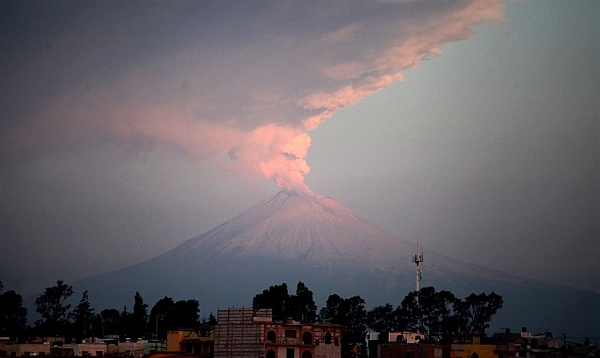April 20 Update: The Popocatepetl volcano shot a heavy plume of smoke and ash into the sky and spewed glowing rock from its crater at dawn on Friday. Although the Televisa television network broadcast images of red, glowing material rising from the crater and falling on its slopes, no new alerts have been raised and no evacuations are planned at this time. We will provide further information as it becomes available.
April 19 Update - Mexico’s Popocatepetl volcano has hurled super-heated rock fragments half a mile into the sky and officials are warning that this is a sign of more serious eruptions to come. The volcano had spouted ash and vapor about 15 times over the last 24 hours which may cause fallouts of abrasive volcanic ash that can ruin car engines and block drains. Alert levels remains high, but no evacuations are planned at present.
Puebla, Mexico, April 18, 2012 - The lava dome of Popocatepetl, the active volcano located in Puebla, Mexico some 40 miles southeast of the nation's capital, is expanding according to Mexico's National Center for Disaster Prevention.
The over 18,000 foot volcano has been spewing fragments of incandescent rock, water vapor, gas, and ash into the air since last Friday.
Due to an increase in activity, authorities raised the alert level for the volcano to Yellow Phase 5 on early Wednesday, the fifth stage of a seven level scale. The alert is now at the highest level of the yellow stage; the next stage is a red alert, which presumably would prompt evacuations to begin.
 |
| Although no evacuations are planned at present, local schools have canceled classes and emergency teams are setting up shelters.(Francisco Guasco/EPA) |
Although no evacuations are planned at present, local schools have canceled classes and emergency teams are setting up shelters should it prove to be necessary.
CENAPRED announced that the area has been closed to visitors and urged people to stay at least seven miles from the crater. It also recommended that people in the surrounding areas clean ash from weak rooftops and to cover their mouths to avoid inhaling it.
"The volcano could experience significant explosions of growing intensity that hurl incandescent rocks significant distances. Large ash showers and flows of mud and molten rocks down the volcano's flanks are possible, the agency said in their statement.
Amid reports of some glowing rock fragments rolling about a quarter mile down the slopes on Wednesday, Jesus Hernandez Mendoza, head of the Regional State Civil Protection Institute, said that the seismic activity occurring at present is within scenarios provided for by Mexico's Scientific Advisory Board and is not yet cause for alarm.
Mendoza also said that the alert could remain in place for weeks or months - until the volcano's activity diminished.
The volcano, known as "El Popo," which sits in the central states of Puebla and Morelos, Mexico, has been erupting intermittently since December 1994. There has been at least 15 documented eruptions but the volcano staged its most violent blow-up in 1,200 years on December 18, 2000, forcing the evacuation of tens of thousands of people.


